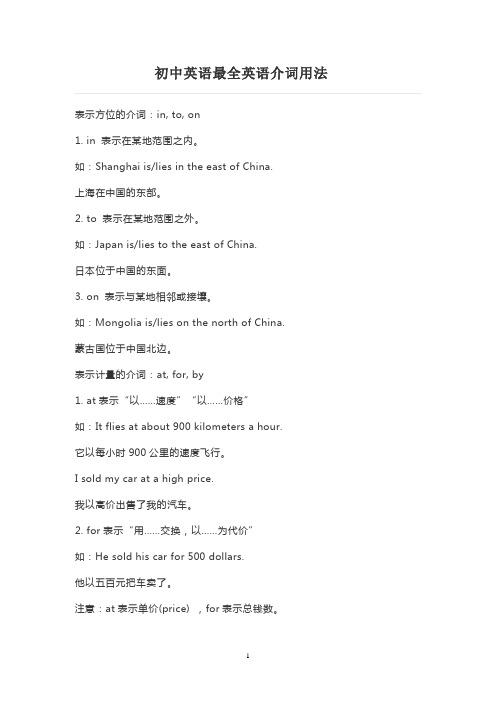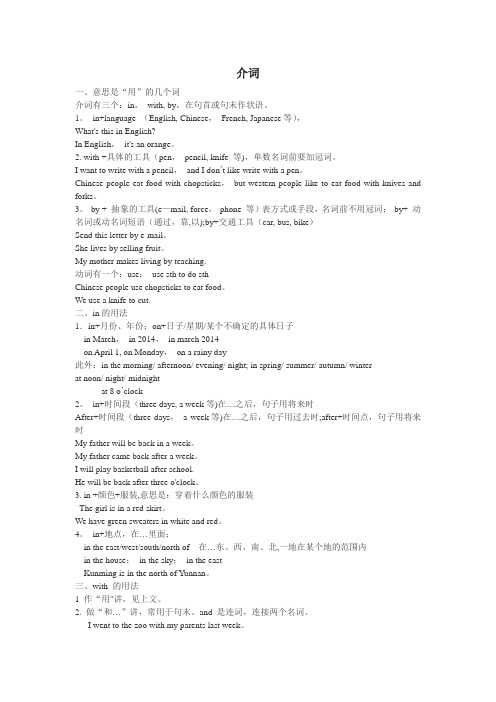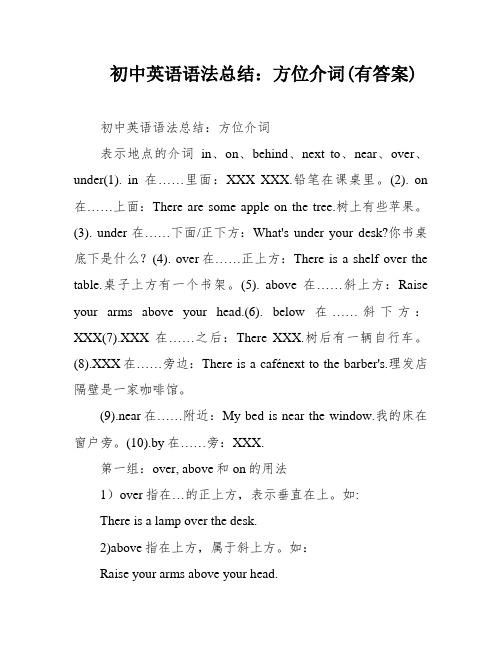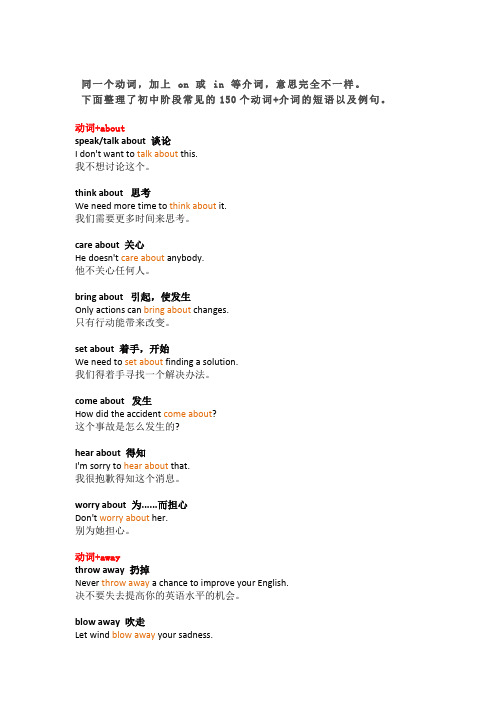初中英语介词用法大全
初中英语最全英语介词用法

表示方位的介词:in, to, on1. in 表示在某地范围之内。
如:Shanghai is/lies in the east of China.上海在中国的东部。
2. to 表示在某地范围之外。
如:Japan is/lies to the east of China.日本位于中国的东面。
3. on 表示与某地相邻或接壤。
如:Mongolia is/lies on the north of China.蒙古国位于中国北边。
表示计量的介词:at, for, by1. at表示“以……速度”“以……价格”如:It flies at about 900 kilometers a hour.它以每小时900公里的速度飞行。
I sold my car at a high price.我以高价出售了我的汽车。
2. for表示“用……交换,以……为代价”如:He sold his car for 500 dollars.他以五百元把车卖了。
注意:at表示单价(price) ,for表示总钱数。
3. by表示“以……计”,后跟度量单位如:They paid him by the month.他们按月给他计酬。
Here eggs are sold by weight.在这里鸡蛋是按重量卖的。
表示材料的介词:of, from, in1. of成品仍可看出原料如:This box is made of paper.这个盒子是纸做的。
2. from成品已看不出原料如:Wine is made from grapes.葡萄酒是葡萄酿成的。
3. in 表示用某种材料或语言如:Please fill in the form in pencil first.请先用铅笔填写这个表格。
They talk in English.他们用英语交谈。
注意:in指用材料,不用冠词;而with指用工具,要用冠词。
如:draw in pencil/draw with a pencil表示工具或手段的介词:by, with, on1、by用某种方式,多用于交通如by bus乘公共汽车,by e-mail. 通过电子邮件。
资料分享初中英语之20个常见介词用法汇编

精选文档初中英语介词用法总括序号功能含义理解中心典型例句朝代、古今、世纪、年月、年、季、月、礼拜、早、下午、夜晚、过去、未来等不详细的、模糊的InTangdynasty;inthe19th century;in1980;inthis1表示时间在某段时间大于1天的时间段。
year;inspring;inaweek;inamonth;inthemorning(注意和at在这方面的差别:at指的是短于1天的时间点)在某个地方国家、地域、省、市、区、太空、天空等Inchina;inhuabei;inBeijing;inthesky(自然意义上的地方)车、教室、商场等2表示地点在某个场所(注意和at在这方面的差别,at一般用在:家、Inthetrain;intheclassroom;角、店、站、口等可能有和露天接触的地方)除实物里面外,注意“光、灯、影、树荫、雨、森Weareintheclassroom;甲处于乙中Theyaresittingintheshadeofatree;林”,有浑身置入某种环境之中的含义在内。
Theyarestudyinginthebirghtlight.3表示未来在此后用在一般未来时中,是从“此刻时间点今后..”Theywillcomebackin10days语言对于“资料“,注意和with在这个用法上的区IwroteanovelinRussian;4单位/别。
Thelengthismeasuredinmeter,andcentimetre;资料(with倾向“工具”,in倾向“资料”)Thisboardwascastingold.状态状态:既能够指人的状态,也可指物的状态;Hewasn’tingoodhealth,sotalkinlowvoice.Ourcountryinrichinnaturalresour方面方面:既可指详细,也可指抽象方精选文档面;ces;Agoodteachermustbeanexampleinstudy衣饰衣饰:尤以颜色和状态常考Heisinredshoestodayinall 总计;ingeneral 一般来说;intime 实时;inadvance 事先;inthemeantime 与此同时;inplace适当地;inthehopeof 怀着希望;inconnectionw ith 和相关 ;incontactwith 和联系;inadditiont o 除以外;incaseof 若是,万一;inconflictwith 和矛盾;inforce 有效的,大量 ;indepth 完全地;inregard t o 对于;in the neighborhood of 大概、周边;in retrospect 回首,一想起;in介词短语behalfof 代表利益 ;inthelongr un从长久说来;inone'sopinion 在看来;inword 口头上;inaword 总之;invain 无益地, 白白地;incase 假如,万一,以防 ;indetail 详尽地;inhaste急赶忙忙地;in 初中阶段应掌握的conclusio n 总之;inspiteof 只管;inotherwords 换句话说;inreturn 作为回报;inthenameof 以名In 的常有短语义;beconfidentin 对有信心;beinterestedin 对感兴趣;indoubt 思疑;inlove恋爱中;indebt欠债;inhesitation 举棋不定;inwonder 在诧异中;inpublic(secret) 公然他(奥密地);inagoodmood( 情 绪)好;indanger,indebt( 欠债),inahurry ;instock( 有库存);inpeace( 安全)(atpeace 和平),believein 相信;breakin breakin 闯进,插嘴,打断;bringin 惹起;产生;带来;comein 进来;流行;call动词短语in 命令回收;takein 汲取、卷起;定阅,被骗,被骗;turn in 上缴,送还;fillin 填补;getin 收获;succeedin 成功;checkin 抵达登记,cutin 插嘴,插入;countin 包含;drawin 时间凑近;dropin 顺道拜访;givein 投诚、折服; goinfor 参加;喜好,追求; handin 交上,上缴;pourin 滔滔而至。
初中英语介词的用法总结

介词一、意思是“用”的几个词介词有三个:in,with, by,在句首或句末作状语。
1。
in+language (English, Chinese,French, Japanese等),What's this in English?In English,it's an orange。
2. with +具体的工具(pen,pencil, knife 等),单数名词前要加冠词。
I want to write with a pencil,and I don’t like write with a pen。
Chinese people eat food with chopsticks,but western people like to eat food with knives and forks。
3。
by + 抽象的工具(e—mail, force,phone 等)表方式或手段,名词前不用冠词;by+ 动名词或动名词短语(通过,靠,以);by+交通工具(car, bus, bike)Send this letter by e-mail。
She lives by selling fruit。
My mother makes living by teaching.动词有一个:use;use sth to do sthChinese people use chopsticks to eat food。
We use a knife to cut.二、in的用法1.in+月份、年份;on+日子/星期/某个不确定的具体日子in March,in 2014,in march 2014on April 1, on Monday,on a rainy day此外:in the morning/ afternoon/ evening/ night; in spring/ summer/ autumn/ winterat noon/ night/ midnightat 8 o’clock2。
初中英语常用介词短语

初中英语常用介词短语1at once 立刻2at last 最后3at first 起先,首先4at the age of…在……岁时5at the end of…在……之末6at the beginning of…在……之初7at the foot of…在……脚下8at the same time 同时9at night/noon 在夜里/中午10with one's help 在某人的帮助下,由于某人的帮助11with the help of …在……的帮助下12with a smile 面带笑容13with one's own eyes 亲眼看见14after a while 过了一会儿15from now on 从现在起16from then on 从那时起17far example 例如18far away from 远离19from morning till night 从早到晚20by and by 不久21by air mail 寄航空邮件22by bike/air/train/bus 骑自行车/乘飞机/火车/汽车23by ordinary mail 寄平信24by the way 顺便说25by the window 在窗边26by the end of…到……底为止27little by little 逐渐地28in all 总共29in fact 事实上30in one's twenties 在某人二十几岁时31in a hurry 匆忙32in the middle of 在……中间33in no time in a minute 立刻,很快34in time on time 及时35in public 公众,公开地36in order to 为了……37in front of 在……前面38in the sun 在阳光下39in the end 最后,终于40in surprise 惊奇地41in turn 依次42of course 当然43a bit of 有一点儿44a lot of 许多45a little 一点儿46on one's way to 某人在去……的路上47on foot 步行,走路48a talk on space 一个关于太空的报告49on the other hand 另一方面50at/on the weekend 在周末51on the left right 在左右边52on the other side of 在……另一边53on the radio 通过收音机无线电广播54to one's joy 使……高兴的是55to one's surprise 使……惊讶的是初中课本中常见介词短语分类列举1.表示时间的介词及介词短语in, at, on, before,after,till,since,for, from to, until, by,in the middle of,at the beginning of, at the end of,at half past five,at night,in a week,in the morning,in class,at sunrise, in spring/summer/autumn/winter,on Sunday,on Saturday afternoon,on a winter evening,for a long time,for two months,after school,since liberation,before lunch,at the time of,at the age of;2.表示地点的介词及介词短语in,at,into,to,on,beside,before,behind,above,under,outside, inside, up, from, far, from, near, across, off, down, among, past,between,out of,around,in the front of, in the middle of, at the back of,at the foot of,at home,at the gate,at the table,in the sky, on the ground,in a tree, in the south,in the sun,in the bed,on one’s way home,by the side of;3.介词和各类词搭配构成的介词短语1.介词与动词搭配arrive in/at到达 ask for要,请求do well in在……方面做得好give in投降go on继续hear from收到……来信 hear of听说help's B.with sth.帮助……做laugh at嘲笑 learn from向……学习leave for离开一地去另一地talk to与……谈话 go in for从事,致力于put up穿上,挂上 take down拿下,取了look at有意识地看 speak to对某人说send for派人去请shout at大声叫喊,吼叫take away拿走,带走think of考虑,关心turn into把……变成 wait for等候,等待take off脱下,起飞turn on/off打开关上listen to听 look after照顾,照看look for寻找 look like 看上去像get to 到达 point to 指着……fill with充满,装满 begin with以……开始deal/do with处置,对待meet with偶尔遇见,遭遇 pass on传递belong to属于write to写信给……call on号召,访问,邀请die of死于……depend on依靠,依赖smile at向……微笑 believe in信任look out向四下看,到处看2.介词与名词搭配in time及时 in bed卧床in life一生中 on time准时,按时in front of在……前面 on foot步行by bus乘公共汽车 at home在家in English用英语 in the middle在中间at night在晚上 at noon在中午at hospital在医院 with a smile带着微笑of course当然可以 in a hurry匆忙,急忙in a minute一会儿by the way顺便说说/问问at first首先,起初 at last最后,终于at the meeting在会上 at least至少on one’s way to在……的路上in the sun在阳光下in a tree在树上in surprise惊奇地 at once立刻,马上at the foot of在……脚下at all压根儿at dinner在吃正餐 at the table在桌子旁at work在工作at school在学校at the back of在……后面at the beginning of在……开始 at the end of在……结尾at the same time同时,然而by hand 用手,手工,亲手by the end of到……结束时by train乘火车day by day日复一日one by one一个接一个by spaceship乘坐宇宙飞船in a low voice大声地in a word总而言之,一句话in trouble处于困境in fact事实上in the street在街上in the end最后,终于in space在空间in no time立刻,很快in order按顺序,整齐,正常in order to为了,以便 in the day在白天in line成一直线in a short while不久in all总共,总计 in town在城里in silence不作声out of breath上气不接下气out of sight消失,看不见on duty值日on the left/right在左/右边on the one handon the other hand一方面……另一方面on the other side of在……的另一边on top of在……顶上 in the distance在远处in public当众,公开地 out of work失业on the radio通过无线电广播to this day直到今天to one’s surprise/joy使某人吃惊/高兴3介词与形容词、过去分词和动词等搭配be born in出生于……be good at擅长……be made of由……制成be angry with s B. 对某人生气be angry at sth. 为某事生气be pleased with s B. 对某人感到满意be satisfied with sth.对某事感到满意be surprised at对……感到惊奇/诧异be tired of讨厌……/厌倦……be interested in对……感兴趣be proud of以……为自豪/骄傲be full of充满……take/catch hold of抓住be sure of确信…… take part in参加break into 闯入take care of照顾,关心,保管be busy with忙于……be strict with对……严格要求catch up with跟上,赶上 have nothing to do with与……无关go to school上学 go to bed/sleep睡觉give a lesson to给……上课go to the cinema 去看电影be kind to s B.对某人友好say hello to向……问好look forward to盼望,期待keep out of不让进入 go on strike罢工be used to习惯于……4.看似相同,但意义有别的词组英语中有一些介词词组和动词词组,它们从形式上看似乎基本相同,但在意义上却截然不同;要是我们在记忆上对这类词组不加以重视,使用时就很容易望文生义,甚至张冠李戴;为此,把这类词组归纳如下:1.介词词组1 at table在进餐at the table在桌子旁=beside the desk2 at desk在读书或做作业at the desk在书桌旁3 at school在校上学指学生at the school在学校指教职工4 in front of the bus在公共汽车的前面不在车上in the front of the bus在公共汽车的前部在车上5 at sea在航海中at the sea在海边6 by day白天by the day按日,论日7 behind time误期behind the time落后于时代8 in class在上课,在课内in the class在这个班9 in bed 卧床,在睡觉in the bed在床上10 in prison坐牢in the prison在监狱11 in red穿着红色的衣服in the red负债,亏损12 in hospital住院指病人in the hospital因事在医院13 in office在办公,执政in the office在办公室14 in secret秘密,私下in the secret参入秘密,参入阴谋15 in place of 代替,而不是in the place of在……地方16 in case of万一,如果in the case of就……来说,至于17 of age成年人of an age同龄人18 out of office离职out of the office离开办公室19 out of prison因犯罪出狱out of the prison因事从监狱出来20 out of question毫无疑问out of the question不可能,办不到2.含有介词的动词词组1 come out of hospital病好出院come out of the hospital因事从医院里出来2 come out of prison刑满释放come out of the prison因事从监狱里出来3 go to school去上学go to the school因事去学校4 go to college上大学go to the/a college去一所学校办事5 go to bed上床睡觉go to the bed去床边6 go to hospital去住院go to the hospital因事去医院7 go to prison去坐牢go to the prison因事去监狱8 go to sea当海员go to the sea去海边9 go to court起诉go to the court因事去法庭10 go to church做礼拜go to the church因事去教堂11 keep house管理家务keep the house守在家里12 take place发生take the place代替3.有无冠词,意义无多大区别的介词词组1atthemost至多2atthefirst起初3alltheday 整天4catchacold感冒5inthefuture 将来6inthememory of纪念7go totheoffice 上班,去办公室8go tothemarket 赶集,去市场9onaholiday 在度假10theday before yesterday 前天11themost of 大多数12withasmiling face 面带微笑1 初中英语:形容词与副词用法专题精讲Ⅰ形容词-命题趋势形容词是历年各省市中考必考知识点;从考查形式看,一般有单项选择、完形填空、词语运用等;所占分值通常为2~4分;从命题意图看,侧重考查考生在具体语言环境中使用形容词的能力;-考查重点中考试题对形容词的考查涉及形容词原级,比较级和最高级的各种句型、形容词作定语的位置、易混淆的形容词用法辨析等;其中,形容词比较等级句型、形容词修饰不定代词something,anything,everything,nothing时的位置,易混淆的形容词用法辨析等是考查的热点;一、形容词的一般用法1.作定语,一般放在所修饰词的前面;例如,It’s a cold and windy day.2.作表语,放在系动词的后面;例如,He looks happy today.3.形容词修饰something,anything,nothing,everything等复合不定代词时,须放在其后;例如,Would you like something hot to drink4.表示长、宽、高、深及年龄的形容词,应放在相应的名词之后;例如,How long is the river It’s about two hundred metres long.5.只能作表语的形容词:afraid害怕;alone独自的;asleep睡着的;awake醒着的;alive活着的;well健康的;ill病的;frightened害怕的例如,The man is ill.正The ill man is my uncle.误6.只能作定语的形容词:little小的;only唯一的;wooden木质的;woolen羊毛质的;elder年长的例如,My elder brother is in Beijing.正My brother is elder. 误7.貌似副词的形容词:lonely独自的;friendly友好的;lively生动的;lovely可爱的8.复合形容词:snow-white雪白的 English-speaking说英语的;glass-topped玻璃罩的;full-time 全日制的;well-known众所周知的;kind-hearted善良的;man-made人造的;take-away可以带走的;ten-year-old十岁的;二、多个形容词修饰名词时,其顺序为:限定词冠词、指示代词、形容词性物主代词、数词——描绘词大小,长短,形状,新旧,长幼,颜色——出处——材料性质——类别——名词A small round table一张小圆桌A tall white building一幢高大的白色建筑物A dirty old black shirt一件又脏又旧的黑色衬衣A famous American medical school一个非常著名的美国医学院三、形容词常用句型1.“It’s +adj.+of+sb.+不定式”表示“某人做某事怎么样”;注意:这一句型中常用描述行为者的性格、品质的形容词,如good好的,kind友善的,nice友好的,polite有礼貌的,clever聪明的,foolish愚蠢的,lazy懒惰的,careful细心的,careless粗心的,right 正确的,wrong错误的等;例如,It’s very kind of you to help me.=You are very kind to help me.你能帮助我,真好;It’s very rude of her to say such words.=She is very rude to say such words.她说这样的话,真粗鲁;It’s foolish of him to go alone.=He is foolish to go alone.他单独出去太傻了;2.“It’s+adj.+for+sb.+不定式”表示“做某事对某人来说怎么样”;注意:这一句型中常用的形容词有important重要的,necessary必要的,difficult困难的,easy容易的,hard艰难的,dangerous危险的,safe安全的,useful有益的,pleasant舒适的,interesting有趣的,impossible不可能的等;例如,It’s not easy for them to learn a foreign language.=To learn a foreign language is not easy for them.对于他们来说学好一门外语不容易;It’s very important for students to listen to teachers carefully.=To listen to teachers carefully is very important for students.对于学生来说上课认真听老师讲课是非常重要的;2 初中英语:形容词与副词用法专题精讲It’s necessary for us to get to school on time.=To get to school on time is necessary for us.对于我们来说按时到校是非常必要的;3.表示感情或情绪的形容词,如glad高兴的,pleased高兴的,sad忧伤的,thankful感激的等常接不定式;例如,Glad to see you.见到你非常高兴;I’m very sad to hear the bad news.听到这个坏新闻,我非常难过;4.表示能力和意志的形容词,如ready乐意的,有准备的,able有能力的,sure一定,certain一定等常接不定式;例如,Lei Feng is always ready to help others.雷锋总是乐于助人;Ⅱ副词-命题趋势副词是历年各省市中考必考知识点;从考查形式看,一般有单项选择、完形填空、词语运用等;所占分值通常为2~4分;从命题意图看,侧重考查考生的具体语言环境中使用副词的能力;-考查重点中考试题对副词的考查涉及常用副词的用法、副词等级的各种句型、易混淆的副词用法辨析等;其中,频度副词always,often,usually,sometimes,never,时间副词already,yet,still,just,疑问副词how,why,when,where,程度副词enough,quite以及too,also,either等的用法区别,副词比较等级句型是考查的热点;一、副词的分类副词按词汇意义可分为:方式副词:well,fast,slowly,carefully,quickly程度副词:very,much,enough,almost,rather,quite地点副词:here,there,out,somewhere,abroad,home,时间副词:today,early,soon,now,then,recently,still频度副词:always,often,usually,sometimes,seldom,never否定副词:no,not,neither,nor,疑问副词:where,how,why其他:also,too,only二、副词的基本用法:副词是用来修饰动词、形容词、其他副词以及全句话的词类,表示时间、地点、程度、方式等概念;例如,1.We should listen to our teachers carefully.我们应该认真听老师讲课;2.He is very happy today.他今天非常高兴;3.“What happened ”I asked,rather angrily.“发生什么事情了”我相当生气地问;4. In spring,I can see flowers everywhere.在春天,我到处都能看到花;三、常见副词用法辨析1.already与yet的区别already用于肯定句句中,表示“已经”;yet用于否定句句末,表示“还”,用于疑问句句末,表示“已经”例如,He had already left when I called.当我给他打时,他已经离开了;Have you found your ruler yet 你已经找到你的尺子了吗I haven’t finished my homework yet.我还没有完成作业;注意:already还可以表示惊奇,惊讶等语气,常用于疑问句句末例如:Has your son gone to school already 你的儿子已经上学了吗表示很惊讶2 very,much和very much.的区别very用于修饰形容词或副词的原级;much用于修饰形容词或副词的比较级;修饰动词要用very much.例如,John is very honest.约翰非常诚实;This garden is much bigger than that one.这个花园比那个大的多;Thank you very much.非常感谢你3.so与such的区别⑴so修饰形容词或副词;such 修饰名词,例如,My brother runs so fast that I can’t follow him.我弟弟跑得那么快以至于我跟不上他;He is such a boy.他是一个这样的孩子;⑵so修饰的形容词后可以有一个单数的可数名词,其结构是“so+形容词+a/an+可数名词单数”.such可以修饰可数名词单复数和不可数名词,名词前可以有形容词作定语,其结构是“such+a/an+形容词+可数名词单数”,“such+形容词+可数名词复数/不可数名词”,3 初中英语:形容词与副词用法专题精讲. 例如,He is so clever a boy.=He is such a clever boy.他是一个如此聪明的孩子;It is such cold weather.这么冷的天气;正It is so cold weather.误They are such good students. 他们是那么好的学生;正They are so good students. 误⑶如果可数名词复数前有many,few或不可数名词前有much,little修饰,用so不用such.例如,so many如此多的;so few如此少的可以加可数名词复数so much如此多的;so little如此少的可以加不可数名词4.also,too,as well与either 的区别also,as well,too,用于肯定句,also常用于be动词,情态动词,助动词之后,行为动词之前;as well,too用于句末;either用于否定句中,置于句末;例如,My father is a teacher. My mother is also a teacher.=My father is a teacher. My mother is a teacher as well.=My father is a teacher. My mother is a teacher,too.我爸爸是一名老师,我妈妈也是;I can’t speak French.. Jenny can’t speak French,either.我不会说法语,詹妮也不会;5.sometime,sometimes,some time与some times的区别sometime:某一时间,某一时刻,可指将来时,也可指过去时sometimes:有时,不时的some time:一段时间some times:几次,几倍. 例如,We’ll have a test sometime next month.下个月的某一时间,我们要进行一次测试;Sometimes we are busy and sometimes we are not.有时我们很忙,有时不忙;He stayed in Beijing for some time last year.他去年在北京呆了一段时间;I have been to Beijing some times.我去过北京好几次;6.ago与before的区别ago表示以现在为起点的“以前”,常与一般过去时连用,不可以单独使用;before指过去或将来的某时刻“以前”,也可泛指以前,常和完成时连用,可以单独使用;例如,I saw him ten minutes ago.我十分钟之前看到的他;He told me that he had seen the film before.他告诉我他以前看过这场电影;7.now,just与just now的区别now:与一般现在时、现在进行时、现在完成时连用,意为“现在”just:与现在完成时、过去完成时连用,表示“刚……”just now:和过去时连用,表示“刚才”. 例如,Where does he live now 他现在住哪里We have just seen the film. 我们刚看过这场电影;He was here just now. 他刚才在这里;He is sure to get to school on time.他一定会按时到校;Ⅲ、形容词,副词的比较级、最高级一、规则变化1.一般在词尾直接加er或est,例如,tall-taller-tallest,long-longer-longest2.以不发音的字母e结尾的单词在词尾直接加r或st,例如,nice-nicer-nicest3.以辅音字母+y结尾的词,把y变为i,再加er或est,例如,heavy-heavier-heaviest4.重读闭音节,末尾只有一个辅音字母,双写这个辅音字母,再加er或est,例如,big-bigger-biggest5.部分双音节词和多音节词分别在原级前加more构成比较级和most构成最高级,例如,slowly-more slowly-most slowly;beautiful-more beautiful-most beautiful二、不规则变化下列单、双音节词只能加more和most.Ⅳ形容词,副词等级的用法一、原级的用法1.只能修饰原级的词,very,quite,so,too例如,He is too tired to walk on.他太累了以至于不能再继续走了;My brother runs so fast that I can‘t follow him.我弟弟跑得那么快以至于我跟不上他;2.原级常用的句型结构4 初中英语:形容词与副词用法专题精讲1“甲+be+倍数+as+形容词原级+as+乙”表示“甲和乙程度相同”或“甲是乙的几倍”例如,Tom is as old as Kate.汤姆和凯特年龄一样大;Tom is twice as old as Kate.汤姆的年龄是凯特的二倍;“甲+实意动词+倍数+as+副词原级+as+乙”表示“甲和乙程度相同”或“甲是乙的几倍”例如,Tom runs as fast as Mike.汤姆和迈克跑得一样快;Tom runs twice as fast as Mike.汤姆跑得速度是迈克的二倍;2“甲+be+not+as/so+形容词原级+as+乙”甲不如乙…例如,This room is not as/so big as that one. 这个房间不如那个大;“甲+助动词+not+动词原形+as/so+副词原级+as+乙”甲不如乙…例如,He doesn’t walk as slowly as you.他走路不像你那样慢;二、比较级的用法1.可以修饰比较级的词,much,a lot,far,…的多a little,a bit,…一点儿even甚至,still仍然例如,Lesson One is much easier than Lesson Two.第一课比第二课容易得多;Tom looks even younger than before.汤姆甚至比以前更年轻;This train runs much faster than that one.这辆火车比那辆跑地快;She drives still more carefully than her husband.她开车仍然比她丈夫还认真;2.比较级常用的句型结构1“甲+be+倍数+形容词比较级+than+乙”表示“甲比乙…”或“甲比乙…几倍”例如,Tom is taller than Kate.汤姆比凯特高;This room is three times bigger than that one.这个房间比那个大三倍;“甲+实意动词+倍数+副词比较级+than+乙”表示“甲比乙…”或“甲比乙…几倍”例如,I got up earlier than my mother this morning.我今天早晨起床比我妈妈还早;He runs three times faster than his brother.他跑的速度比他弟弟快三倍;2“甲+be+形容词比较级+than+any other+单数名词+介词短语”表示“甲比同一范围的任何一个人/物都……”,含义是“甲最……”;例如,The Yangtze River is longer than any other river in China.=The Yangtze River is longer than any of the other rivers in China.长江比中国的任何一条其他的河都长;=The Yangtze River is longer than the other rivers in China.长江比中国的其他所有的河都长;=The Yangtze River is the longest river in China.长江是中国最长的河流;注意:The Yangtze Riveris longer than any river in Japan.长江比日本的任何一条河都长;“甲+实意动词+副词比较级+than+anyother+单数名词+介词短语”表示“甲比同一范围的任何一个人/物都……”,含义是“甲最……”;例如,Mike gets to school earlier than any other student in his class.= Mike gets to school earlier than any of the other students in his class.迈克比他们班上任何一个其他的同学到校都早;= Mike gets to school earlier than the other students in his class.迈克比他们班上其他的同学到校都早;= Mike gets to school earliest in his class.迈克在他们班到校最早;注意:Mike gets to school earlier than any student in Tom’s class.迈克比汤姆班上任何一个学生到校都早;迈克和汤姆不是同一个班3“甲+be+the+形容词比较级+ofthetwo+……”表示“甲是两者中较……的”;例如,Look at the two boys.My brother is the taller of the two.看那两个男孩,我弟弟是两个当中较高的那个;4“比较级+and+比较级”表示“越来越……”;例如,He is getting taller and taller.他变得越来越高了;The flowers are more and more beautiful.花儿越来越漂亮;5 初中英语:形容词与副词用法专题精讲He does his homework more and more carefully.他做作业越来越认真了;5“the+比较级,the+比较级”表示“越……,越……”;例如,The more careful you are,the fewer mistakes you’ll make.你越认真,犯的错误越少;6“特殊疑问词+be+形容词比较级,甲or乙”例如,Which is bigger,the earth or the moon 哪一个大,地球还是月球“特殊疑问词+实意动词+副词比较级,甲or乙”例如,Who draws better,Jenny or Danny 谁画得比较好,詹妮还是丹尼3.最高级常用句型结构1“主语+be+the+形容词最高级+单数名词+in/of短语”表示“……是……中最……的”;例如,Tom is the tallest in his class./of all the students.汤姆是他们班上/所有学生当中最高的;This apple is the biggest of the five.这个苹果是五个当中最大的;“主语+实意动词+the+副词最高级+单数名词+in/of短语”表示“……是……中最……的”;例如,I jump the farthest in my class.我是我们班跳得最远的;2“主语+be+oneofthe+形容词最高级+复数名词+in/of短语”表示“……是……中最……之一”;例如,Beijing is one of the largest cities in China.北京是中国最大城市之一;3“特殊疑问词+be+the+最高级+甲,乙,or丙”用于三者以上的比较;例如,Which country is the largest,China,Brazil or Canada 哪一个国家最大,中国,巴西还是加拿大“特殊疑问词+be+the+副词最高级+甲,乙,or丙”用于三者以上的比较例如,Which season do you like the best,spring,summer or autumn 你最喜欢哪一个季节,春天,夏天还是秋天-例题剖析1 I have_____to do today.A.anything importantB.something importantC.important nothingD.important something答案B形容词修饰复合不定代词时应放在其后面;故排除C、D,句意是“我今天有重要的事情要做”,表示肯定用something;2 ———Is chemistry more difficult than physics———No,chemistry isn’t as____as physics.A.easyB.difficultC.easierD.moredifficult答案Bnotas…as中应接形容词原级,结合上句“化学没有物理难”,故B是正确的;3.Beijing is becoming_________and__.A.more beautiful,moreB.beautiful,beautifulC.more,more beautifulD.more beautiful,more beautiful答案C比较级+and+比较级,表示“越来越…”,多音节的形容词“more and more+形容词”;4.______ children there are in a family,_____their life will be.A.The less,the betterB.The fewer,the betterC.Fewer,richerD.More,poorer答案Bthe+比较级,the+比较级,表示“越……越……”,由句意得知“家里孩子越少,生活会越好”;children是可数名词,应用few来修饰;5.The experiment was ________ easier than we had expected.A.moreB.much moreC.muchD.more much答案C much可修饰比较级,easier本身已是比较级,不能再用more.6 Oct 15th was one of ________ days in 2003.The Shenzhou-V was sent up successfully.A.excitingB.more excitingC.the most excitingD.much exciting答案C根据“one of+最高级+复数名词”固定句型应选C;7.It’s seven o’clock in the afternoon,but they are ______ having a meeting.Aalready B.still C.yet D.ever答案Bstill意为“仍旧,仍然”,这句话的意思是:现在已经是下午七点,他们仍旧在开会;6 初中英语:形容词与副词用法专题精讲8.Remember not to speak _______ when we are in the reading room.A.fastB.slowlyC.politelyD.loudly答案D“在阅览室里不要大声说话”,副词loudly修饰动词speak.9.“______ has this food store been in business ”“Since 2001.”A.How longB.How oftenC.How oldD.How soon答案A“since+过去时间点”为“从过去的某一时间到现在”,表示一段时间,故选“how long”.10.———What was the weather like yesterday———It was terrible.It rained so ___ that people could _________ go out.A.hardly…hardB.hardly…hardlyC.hard…hardlyD.hard…hard答案Crain在句中是动词,作谓语,后面用副词修饰,hard作副词,是“猛烈地”的意思,hardly是“几乎不”的意思;-同步练习1.What a ____ coughYou seem_____ill.A.terrible,terriblyB.terribly,terribleC.terrible,terribleD.terribly,terribly2.I feel even_____now.A.badB.wellC.worseD.worst3.She was very happy. She ran_____of all the runners.A.fastestB.the quickestC.slowestD.quickly4.Keep quiet,please.It’s_____noisy here.A.many tooB.too manyC.much tooD.too much5.———Have you _____ spoken to a foreigner———No,_____.A.already,neverB.ever,neverC.yet,alreadyD.ever,ever6.He is taller than_________in his class.A.any boyB.anyC.any other boyD.some other boys7.I’ll go and visit you ____ next week.A.sometimeB.sometimesC.some timesD.some time8.The car is running________.It seems to be flying.A.more and fasterB.more and fastC.fast and fastD.faster and faster9.English is as _____ as Chinese.You should learn it well.A.importantB.more importantC.the most importantD.much more important10.Music is not so useful as science.It’s ________ useful than science.A.fewerB.less C more D.a lot11.We’ve never heard of_____story before.A.such a strangeB.such strangeC.so a strangeD.so strange12.You must wear glasses.They can keep your eyes______.A.softB.safeC.safelyD.safety13.Pass my glasses to me,Jack.I can_____read the words in the newspaper.A.hardlyB.reallyC clearlyD.rather14.Three years _______,he become a driver.tetertelyD.more lately15.He is ______ enough to carry the heavy box.A.strongerB.much strongerC.strongD.the strongest16.I bought _____ exercise-books with____money.A.a few,a fewB.a few,a littleC.a little,a fewD.a little,a little17.The box is _____ heavy for the girl____carry.A.too,toB.to,tooC.so,thatD.no,to18.Do you have ____ to tell usA.something newB.new somethingC.anything newD.new anything19.———Do you think the fish tastes_______———She cooked it______,Ithink.A good,goodB well,goodC well,wellD good,well20.She played the piano_____than we had thought.A.successfulB.successfullyC.more successfulD.more successfully参考答案1-5:ACACB 6-10:CADAB 11-15:ABABC 16-20:BACDD7 初中英语:形容词与副词用法专题精讲活学活用:巧记形容词的排列顺序当两个以上形容词修饰一个名词,形容词该如何排列为什么不能说 a black new pen,而是说成 a new black pen 这里面有无规则可循如果你记住Opshacom这个为帮助记忆而杜撰的词, 就能掌握英语中形容词排列的顺序; Opshacom中p代表opinion,指表示人们观点的形容词,如beautiful,horrible,lovely,nice等;sh代表shape,指表示形状的形容词,如long,short,round, narrow等;a代表age,指表示年龄、时代的形容词,如old,new,young等;c代表colour,指表示颜色的形容词,如red,black, orange等;o代表origin,指表示国籍、地区的形容词,如British,Canadian,German等;m代表material,指表示材料的形容词,如plastic,metal,aluminium等; 英语中这六类形容词连用时就按上述先后顺序排列, 如a nice long new black British plastic pen 当然,实际语言使用中不可能出现这么多形容词连用的情况;请根据形容词排列规则完成以下练习:1.She has a ___ jacket.leather,brown,beautiful2.He has a ___ car. American,long,red3.They live in a ___ house. old,beautiful4.We have a ___ table. antique,small,wooden5.He has a ___ jumper. woollen, lovely, red6.She has a ___ ring. diamond,new,fabulous7.It was a ___ song.French,old, lovely8.He owns a ___ dog.black,horrible,big9.She bought a ___ scarf.gorgeous,silk,pink10.I saw a ___ film. new,fantastic, British答案: 1.beautiful brown leather jacket. 2.long red American car. 3.beautiful old house. 4.small antique wooden table. 5.lovely red woollen jumper. 6.fabulous new diamond ring. 7.lovely old French song. 8.horrible big black dog. 9.gorgeous pink silk scarf. 10.fantastic new British film.特殊数字的表示法一;细心审题,解析每一考查点,分析题干;中考题大多灵活多样,是对学生分析题目的能力的检验,所以要认真思考提供的全部信息,避免乱套语法规则;例:Would you like __________ pears, please 〔吉林〕A. anyB. some C .much D. little析:有些学生没有认真审题,就乱套语法规则,认为疑问句中必须用any,而忽略了表示征求意见、请求等应用some.故正确答案为B.二、多向思维,分析"陷阱" .一些"陷阱题",往往是根据同学们思维上的弱点而设计的,对于中学生来说,要注意克服思维上存在着习惯、单一、片面、混乱的缺陷;例:The radio is too noisy. Would you please turn it ____a little 〔辽宁〕A .on B. off C. up D. down析:学生们一看此题很高兴,马上想到了有关turn 的短语,向导前边说声音大,那肯定是关上了,于是就选了C,关上,而忽略了句末有a little一词,故不可选用off,而应选down,指把音量"关小一点 ",而不是“关掉一点”,故答案是D.三、考查个别易混、易错词,或容易造成思维定向的特殊词;好多学生对知识的把握非常死,乍一看题目简单,心里很是高兴,马上拿笔就答,但往往是错误的,说明他们的灵活应变能力很弱,稍微变一下形就出错,所以对做表面上看似容易的题更要小心谨慎;例:She is a good student, she study ____,but the problem is hard, she ______ work it out by herself. 江西A. hardly, hardB. hard ,hardC. hardly, hardlyD. hard, hardly.析:有的学生只知道hard是形容词,误认为hardly是它的副词形式就选C,而忽略了hard 既是形容词也是副词,而hardly的意思是“几乎不”的意思,再依据句意,所以选择D.四、去伪存真,排除障碍;鱼目混珠的"陷阱题",大多数是以选择题的形式出现,因此,对基本知识点, 要彻底搞懂了为止,这样才会分清选择题目中的鱼目及珍珠,避免出错;例:--The newspaper said that the famous singer would come here this evening.---Yes. It is really ______ that he didn’t .A. wrongB. sorryC. strange surprised析:乍一看题目,学生很容易想到“很抱歉,他没来;”但是主语是it,指他要来这件事,而不是sb,故排除;如用surprised, 主语也应是sb, wrong 不符合句意,故选C.指他没来这件事情;五、加强验证,走出迷宫;"迷宫"总能使一些人落入"迷失方向",怎么办在平时训练中,应注意掌握走出"迷宫"的方法,加强验证,就是一种行之有效的方法;。
介词(37张PPT)初中英语专项复习课件

常+时间点
before
He must be back home before 10
介词
till/until
用法
表示“到……为止;直至”。
举例
He didn’t leave the office until 12 o’clock. (非延续性动词) Let’s stay here till tomorrow. (延续性动词)
she decided to do. 她知道, 无论她决定做什么,她的家人肯定会支持她。
妙辨异同:in front of/in the front of/in front
in front of:表示“在……前面”, 为介词短语, 指在某人/物体前 面。
in the front of:表示“在……前部”,为介词短语,指在某一物体 内部的前面。
above 表示“在……上方; 在……之上”,不一定在正上方,反义词为
below; over 表示“在……的上方”,强调位于物体正上方,反义词为under(两个 物体间有接触或无接触); on 表示“在……上”,强调两个物体间有接触; against 表示“倚; 靠; 撞”。
A plane is flying above us. I could hear the noise in the yard below my window. There are many books on the shelf. There is a bridge over the river. There is a ball under the teacher’s desk. Bob sat down against a tree.
in front:表示“在前面”,为副词短语。walk in front 走在前面
初中英语语法总结:方位介词(有答案)

初中英语语法总结:方位介词(有答案)初中英语语法总结:方位介词表示地点的介词in、on、behind、next to、near、over、under(1). in在……里面:XXX XXX.铅笔在课桌里。
(2). on 在……上面:There are some apple on the tree.树上有些苹果。
(3). under在……下面/正下方:What's under your desk?你书桌底下是什么?(4). over在……正上方:There is a shelf over the table.桌子上方有一个书架。
(5). above在……斜上方:Raise your arms above your head.(6). below在……斜下方:XXX(7).XXX在……之后:There XXX.树后有一辆自行车。
(8).XXX在……旁边:There is a cafénext to the barber's.理发店隔壁是一家咖啡馆。
(9).near在……附近:My bed is near the window.我的床在窗户旁。
(10).by在……旁:XXX.第一组:over, above和on的用法1)over指在…的正上方,表示垂直在上。
如:There is a lamp over the desk.2)above指在上方,属于斜上方。
如:Raise your arms above your head.3)on指在上面,表示两物体接触。
如:There is a cup on the table.第二组:under / below的用法:1) under在……上面/正下方:What's under your desk?2) below在……斜下方:XXX.操演:() 1 The boat is passing___ the bridge.A. XXX() 2 Two planes are flying___ the city.A. XXX, below() 3 We can see a river running to the east____ the XXX() 4 Do you see the kite ___ the building.A. XXX参考谜底C B B D第三组:in和on透露表现“在……上”门一类——镶嵌在墙里的,用in书画一类——挂在墙面上的,用on() 1 He put up a map ___ the back wall because there was a hole ___ it.A. on; onB. at; inC. on; inD. on; at() 2 There is a door___ the wall.A. XXX() 3 Any man ___ eyes______ his head can see that he'XXX.A. with; onB. with; inC. on; withD. in; with鸟一类落在树上的,用in;XXX一类长在树上的,用on() 1 There are some birds singing___ the trees.A. XXX() 2 There are so many apples___ that tree.A. inB, XXX第四组:XXX表示“接壤”第四组:XXX表示“接壤”BABAB在A里——用inA和B相邻(接壤)——用onABA和B不相邻(不接壤)——用to练() 1 The United States is ____ the south of Canada and ___ the east of Japan.A. to; inB. on; toC. in; besideD. at; on() 2 The man stood ____the window, XXX() 3 Japan lies____ the east of China.A. XXX参考答案B B B B第五组:at, in表示“在……”1)at透露表现较小的地址。
初中英语常见的150个动词+介词的短语以及例句

同一个动词,加上on 或in 等介词,意思完全不一样。
下面整理了初中阶段常见的150个动词+介词的短语以及例句。
动词+aboutspeak/talk about 谈论I don't want to talk about this.我不想讨论这个。
think about 思考We need more time to think about it.我们需要更多时间来思考。
care about 关心He doesn't care about anybody.他不关心任何人。
bring about 引起,使发生Only actions can bring about changes.只有行动能带来改变。
set about 着手,开始We need to set about finding a solution.我们得着手寻找一个解决办法。
come about 发生How did the accident come about?这个事故是怎么发生的?hear about 得知I'm sorry to hear about that.我很抱歉得知这个消息。
worry about 为......而担心Don't worry about her.别为她担心。
动词+awaythrow away 扔掉Never throw away a chance to improve your English.决不要失去提高你的英语水平的机会。
blow away 吹走Let wind blow away your sadness.让风吹走你的悲伤。
carry away 拿走,使入迷You should carry the rubbish away at once. 你应该立刻把垃圾带走。
clear away 清除掉,消散He's got clear away.他逃得无影无踪。
die away 逐渐消失The sound died away in the distance.声音逐渐消失在远方。
初中英语介词用法总括

初中英语介词用法总括1.in序号功能含义理解核心典型例句1 表示时间在某段时间朝代、古今、世纪、年代、年、季、月、星期、早、下午、晚上、过去、将来等不具体的、模糊的大于1天的时间段。
(注意和at在这方面的区别:at指的是短于1天的时间点)in Tang dynasty;in the 19th century;in 1980;in this year;in spring;in a week;in a month;in the morning2 表示位置在某个地方国家、地区、省、市、区、太空、天空等…(自然意义上的地方)in china;in huabei;in Beijing;in the sky在某个场所车、教室、超市等(注意和at在这方面的区别,at一般用在:家、角、店、站、口等可能有和露天接触的地方)in the train;in the classroom;甲处于乙中…除实物里面外,注意“光、灯、影、树荫、雨、森林”,有全身置入某种环境之中的含义在内。
We are in the classroom;They are sitting in the shade of atree;They are studying in thebrightlight.3 表示将来在…以后用在一般将来时中,是从“现在时间点往后..”They will come back in 10 days4 语言单位材料/关于“材料“,注意和with在这个用法上的区别。
(with偏向“工具”,in偏向“材料”)I wrote a novel in Russian;Thelength is measured in meter, andcentimetre;This board was castin gold.5 状态方面服饰/状态:既可以指人的状态,也可指物的状态;方面:既可指具体,也可指抽象方面;服饰:尤以颜色和状态常考He wasn’t in good health,so talk inlow voice. Our country inrich in naturalresources; A good teachermust be an example in study He isin red shoes today初中阶段应掌握的In的常见短语介词短语in all 总计;in general 一般来说;in time 及时;in advance 事前;in themeantime 与此同时;in place 适当地; in the hope of怀着……希望;inconnection with 和……有关;in contact with 和……联系;in addition to学习好资料欢迎下载。
- 1、下载文档前请自行甄别文档内容的完整性,平台不提供额外的编辑、内容补充、找答案等附加服务。
- 2、"仅部分预览"的文档,不可在线预览部分如存在完整性等问题,可反馈申请退款(可完整预览的文档不适用该条件!)。
- 3、如文档侵犯您的权益,请联系客服反馈,我们会尽快为您处理(人工客服工作时间:9:00-18:30)。
初中英语介词用法大全介词在初中英语考试中是必考知识点,不少同学对介词的分类、用法都非常的模糊不知道那种情况用什么样的介词,下面为大家整理出来介词的具体分类和用法大全,帮助大家提升对介词的认识。
介词的定义介词是一种虚词,不能独立充当句子成分,需与动词、形容词和名词搭配,才能在句子中充当成分。
介词是用于名词或代词之前,表示词与词之间关系的词类,介词常与动词、形容词和名词搭配表示不同意义。
介词短语中介词后接名词、代词或可以替代名词的词 (如:动名词v-ing) . 介词后的代词永远为宾格形式。
介词的分类一、表示时间的介词( 一) 表示时间段的介词(1) in , afterin +时间段,表示从现在起往后推算一段时间after +时间段,表示过去某时间往后推算一段时间,如:He’ll come back in two days. 但点钟用 after( after three o’clock) He left on July 2 and returned after three days.(2) in , during表示在一段特指的时间内,可用 in 或 duringThe work was done in / during the holidays.表示年份、月份、季节用 in , 如:in 1999 ,in June , in winter(3) in last, for the past + 时间段, during表示在最近一段时间内,句中谓语动词常用现在完成时I have been in Shanghai in the last few years.(4) for 表示延续一段时间。
I’ll study in the U.S for two yearsI’ve waited for Bingo for half an hour.(二) 表示某一时间的介词(1) at, onat 表示某一时刻,on 表示某一天或日期, 如:at 7:14, on Saturday morning on the night of May2一天内各段时间表达, 选用正确的介词,请比较:in the morningon a winter / snow / cold / morningat nighton the night of March 7thin the eveningon Friday evening(2)before, bybefore 表示某一时间之前,而 by 表示到某一时间止,句中谓语动词多用完成时态。
如::You must get up before six. 你必须六点之前起床。
By the end of last month the boy had got 4 “As”.到上月底这个男孩已得了4 个 A.(3) after , sinceafter 可以表示过去某一点时间之后,并不延续说话时间,和一般过去连用,而 since 表示从过去某时间开始的一段时间延续到说话时间, 与现在完时连用如;My father lived in Shanghai after liberation .解放后我父亲住在上海.Since the end of last year the lady has given five concerts.自去年年底以来,这位女士开了五十场音乐会(4) from…to, until / tillfrom----to 表示从某一点时间到另一点时间的一段时间,而 until till表示某动作或状态延续到某点时间如:My mother studied in Beijing University from 1960 to 1964.从 1960 年到 1964 年我妈妈在北京大学学习。
My mother entered Beijing University in 1960, and studied there until 1964.我妈妈 1960 年进入北京大学,一直学习到 1964 年。
(但“从早到晚”常表达为 from morning till night)(三) 不用介词表示时间的词或词组含 this, that, last, next 的表示时间的名词词组,以及某些时间的副词或名词词组前不用介词,如:this year last summer, yesterday , the day after tomorrow 等。
二、表示事物之间位置的介词(1) at, in当事物被视作一点,不强调其空间常用介词 at, 而表示空间内部用介词 in, 如:We’ll meet at the supermarket 我们在超市见面I had to stay in the supermarket as it was raining hard因为下大雨,我只好呆在超市里动词 arrive 后接 at ,表示较小的地方, 如: 车站、村庄等.后接 in 表示较大地方,如: 城市,地区等(2) in, toin 表示事物在区域范围内的位置,to 表示事物对区域范围之外另一事物的位置,如:Shanghai is in the east of China. 上海在中国东部Japan lies to the east of China. 日本位于中国东面。
in front of 表示在前面,一般不在范围内,in the front of 表示在前面. 在同一范围内。
(3)after,behindafter 指顺序先后 ,behind 指位置在某事物之后,相对于 in front of 而言, 如:He entered the classroom after the teacherHe hid himself behind the door 他在门后。
(4) on , inon 表示“在某事物表面上” 。
如将事物看作空间,表示在其内部,用介词in。
There is a modern painting on the wall .There is a modern painting on the wall .(5) from , off 都表示“离开”(6) above , over, below , underover , under 表示垂直的上下关系,而 above, below 仅表示位置上“高于”或“低于”, 不表示垂直关系。
(7)between,amongbetween 表示“两个事物之间”, among 表示“三者以上的事物之间”。
三、表示运动方向的介词(1) into, inside , in 从外到内如:He went quickly into / inside the room.He went quickly into / inside the room.(2) out of 从里到外,相当于 outside, 或从里向外,相当于 from She went out of from the office in a hurry 她匆匆走出办公室. The boy watched the buses, cars and bikes out from the window . 这男孩透过窗观看外面的公交车、小汽车和自行车。
(3) on 在……表面,onto 到……上A boat is on the river. 一条小船在河上。
He jumped onto a tree. 他跳上一棵树(4) across 穿过一平面、through 穿过一空间The boy kicked the ball hard and it moved across the grass.这男孩用力踢球,球飞过草地。
The train moved fast through the tunnel. 火车飞驶隧道。
(5) The train moved fast through the tunnel. 火车飞驶隧道。
She walked to the bank 她步行到银行去She swam towards the shore 她朝岸边游去。
四、常用介词用法比较(1) as , likeas 表示“作为”强调身份,like (介词)表示“像”As a teacher, he cares for these children.Like a teacher, he cares for these children.(2) with , inwith 表示“外貌特征或附带的东西” ,“ 用……作工具”in 表示”衣着” ”用某语言”, 在固定搭配中也可用 inA man with dark glasses wanted to buy drinks.A man in black wanted to buy drinks.The boy is learning to write in pencil / with a pencil.He retold the text in English.(3) for , tofor 表示“为了. ”To 表示动作对象, “对, 向. ” 如:He would do anything for his motherland.Did you mention this to my father?你对我父亲提起过这件事吗?for 表示“就某情况而说”, to 表示一“对某对象而言”如:It’s quite warm today for February.就二月的天气,今天够暖和的。
What he told you just now was not new to me他刚才对你所说的话对我并不新鲜for 表示“目的,用途” 。
与 go, come 动词连用,(4)except ,besidesexcept 表示“从总体中排除一部分”, 与 bat 同义, besides 表示“除了一部分还有另一部分”We all failed except him. 我们都失败了,但他没有。
He speaks German besides French.他懂法外还会讲英语。
(5) 注意成对介词的用法:get into (out of ) the car, get on (off) the bus, jump onto (off) the platform, out of(6) 介词和名词动词等有不少固定搭配和习惯用法:to one’s surprise / joy, in charge of , instead of, in bed (hospital), in trouble, in a hurry, in surprise, with a smile, with one voice, according to, at once, on time, in time, in all, at home, (school, work), at last, at least, in the end, by the way, forexample, at the same time, at the same speed, on one’s way (to), in the sun, on the football team, in line, with the help of, in red / green … put on, look for, look after, run after, send for, enter for, pay for, show…around, listen to, arrive in / at, get to, agree with, succeed in, think of (about), wait for,….(7) 表示加减乘除,分别用介词 plus, minus, times 和动词过去分词divided + by复习时需要注意的要点(1) 介词一般放在名词之前,但它后面的介词宾语是疑问代词、疑问副词或者关系代词时,这些词提到了前面而只剩下介词在后了。
